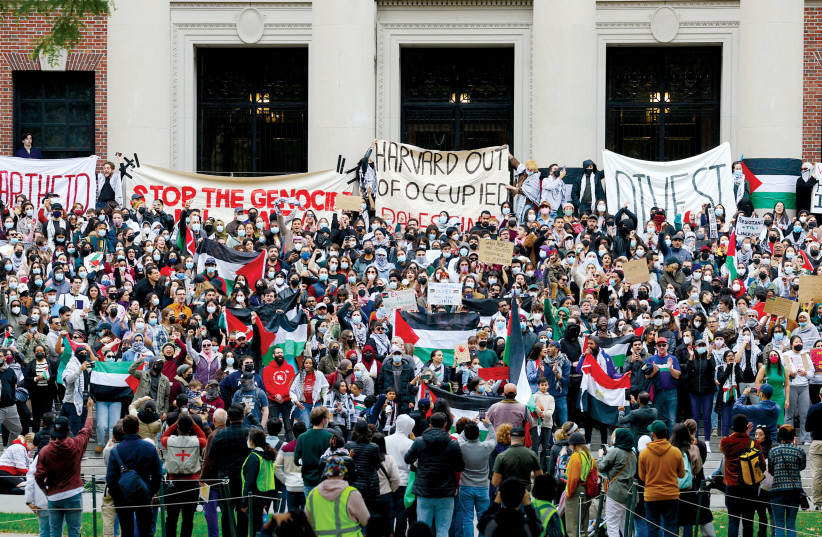Gone are the days when our biggest worries were a pop quiz or late assignment.
Not one week after Israel suffered the worst terror attack in its history, self-proclaimed “activists” on college campuses began to support the murderous rampage perpetrated by Hamas.
At the University of Maryland, College Park, anti-Israel protesters chanted, “There is only one solution, intifada revolution,” and chalked “Long live the intifada” on a main campus plaza. At UC Davis, students read out the names of “martyrs,” offering no distinction between innocent civilians and Hamas terrorists. They also chanted in Arabic what translates to “from water to water, Palestine is Arab.” At UC Berkeley, protesters declared, “We don’t want no two states, we want all of 48,” and later encircled Jewish students, shouting “Zionist shame.”
Cloaked in the language of liberation and resistance, the grave implications of popular slogans are overlooked. When you bellow “intifada” across campus, you dredge up our collective nightmare of losing over 1,400 Israelis in the First and Second Intifadas. When you yell “glory to our martyrs,” you’re exalting a legacy of violence and despair, celebrating figures drenched in the blood of the innocent. And when you scream at Jewish students, telling them to “take a shower” or ominously whisper, “We know where you live, Jew,” you’re not making a political statement. You’re dragging us, in 2024, to the darkest chapters of history, insisting we relive the trauma of ghettos and genocides. This isn’t advocacy; it’s an affront to our shared humanity – a deliberate provocation wrapped in the banner of free speech.
What do these phrases mean?
Anti-Israel agitators have succeeded in distorting the meaning of phrases and sanitizing their messaging when appealing to those who have little knowledge of the conflict. We have taken it upon ourselves to unpack the factual meaning behind these phrases.

“From the River to the Sea, Palestine will be free.”
This slogan advocates for dissolving Israel’s presence on land, from the Jordan River to the Mediterranean Sea. This phrase disregards the historical and UN-acknowledged Jewish ties to the land, signaling a stance that goes beyond seeking peace to suggesting the dismantling of the Jewish state.
“There is only one solution, intifada revolution.”
During the First Intifada (1987-1990), Israelis faced stones and Molotov cocktails. The Second Intifada (2000-2005) escalated to terrorists bombing public spaces to maximize Israeli casualties.
“We don’t want no two-state, we want all of ’48.”
This slogan rejects the two-state solution, advocating instead for reclaiming all territory from pre-1948 British Palestine, dismissing the prospect of mutual freedom and coexistence.
Are we, as an academic collective, willing to endorse rhetoric that, whether through ignorance or malice, echoes some of the most violent chapters in human history? Can we stand by as calls for “Intifada” and praises for “martyrs” are bandied about, not just as political slogans, but as rallying cries that have real-world implications of violence and loss?
These aren’t just words; they’re loaded with a history that speaks of pain, suffering, and the loss of innocent lives. They carry with them the weight of actions that have torn families apart, decimated communities, and fueled endless cycles of retaliation and grief. By chanting these phrases without understanding their impact, we risk trivializing this history, desensitizing ourselves to the gravity of such calls to action and, perhaps most dangerously, normalizing violence as a legitimate form of protest.
This isn’t just about the right to protest or freedom of speech. It’s about what happens when that freedom is divorced from responsibility and an informed understanding of the issues at hand. In this climate of outrage over understanding, the historical intricacies of the Israeli-Palestinian conflict are flattened into slogans, erasing the human cost on all sides.
To those who’ve brandished these phrases: If pressed to explain the meaning behind your slogans, can you? Will you, with facts and understanding, justify the weight of your words and the accusations they carry? We stand ready to debate ours with evidence and context.
To our administrators and professors, we ask: What is your stance? When speech skirts the edge of legitimate threats, why does it not trigger the safeguards our university policies claim to uphold against such behavior? This isn’t merely about policy; it’s a question of principle.
Our diverse backgrounds span different campuses, cultures, and creeds, stretching from various parts of the US to Israel, encompassing families of refugees and long-established citizens alike, and representing a wide political spectrum. Our fields of study are just as varied, including STEM, medicine, and business. Despite our differences, the divisive echo of Jew-hate on our campuses unites us in a shared sense of vulnerability, stirring a collective unease that galvanizes our resolve.
We stand together, asking for thoughtfulness and research before the utterance of slogans. In a world where pop quizzes and late assignments once topped our list of worries, we find ourselves longing for the day when such trivialities will once again dominate our academic experience, and the pursuit of knowledge in an atmosphere of safety and respect becomes our shared reality.
Danielle Sobkin is a University of California-Berkeley undergraduate, Gabriel Gaysinsky is a UC Davis undergraduate, and Einav Tsach is a University of Maryland, College Park undergraduate.
